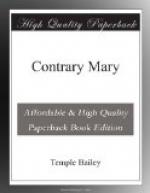But Roger did not laugh.
And when Mary came to look for him he was gone.
And up-stairs, his evening stripped of its glamour, he told himself that he had been a fool! The world would not end to-night. He had to live the appointed length of his days, through all the dreary years.
CHAPTER VI
In Which Mary Brings Christmas to the Tower Rooms; and in Which Roger Declines a Privilege for Which Porter Pleads.
On Christmas Eve, Mary and Susan Jenks brought up to Roger a little tree. It was just a fir plume, but it was gay with tinsel and spicy with the fragrance of the woods, and it was topped by a wee wax angel.
In vain Mary and Barry and even Aunt Isabelle had urged Roger to join their merrymaking downstairs. Aunt Frances, having delayed her trip abroad until January, was coming; and except for Leila and General Dick and Porter Bigelow, it was to be strictly a family affair.
But Roger had refused. “I’m not one of you,” he had told Mary. “I’m a bee, not a butterfly, and I shouldn’t have joined you on Thanksgiving night. When you’re alone, if I may, I’ll come down—but please—not with your guests.”
He had not joined them often, however, and he had never again shown the mood which had possessed him when his voice had charmed them. Hence they grew, as the days went on, to know him as quiet, self-contained man, whose eyes burned now and then, when some subject was broached which moved him, but who, for the most part, showed at least an outward serenity.
They grew to like him, too, and to depend upon him. Even Aunt Isabelle went to him for advice. He had such an attentive manner, and when he spoke, he gave his opinion with an air of comforting authority.
But always he avoided Porter Bigelow, he avoided Leila, and most of all, he avoided Delilah Jeliffe, although that persistent young person would have invaded the Tower Rooms, if Mary had not warned her away.
“He is very busy, Lilah,” she said, “and when he isn’t, he comes down here.”
“Don’t you ever go up?” Delilah’s tone was curious.
“No,” said Mary, “Why should I?”
Delilah shrugged. “If a man,” she said, “had looked at me as he looked at you on Thanksgiving night, I should be, to say the least—interested——”
Mary’s head was held high. “I like Roger Poole,” she said, “and he’s a gentleman. But I’m not thinking about the look in his eyes.”
Yet she did think of it, after all, for such seed does the Delilah-type of woman sow. She thought of him, but only with a little wonder—for Mary was as yet unawakened—Porter’s passionate pleading, the magic of Roger Poole’s voice—these had not touched the heart which still waited.
“Since Mahomet wouldn’t come to the mountain,” Mary remarked to her lodger as Susan deposited her burden, “the mountain had to come to Mahomet. And here’s a bit of mistletoe for your door, and of holly for your window.”




